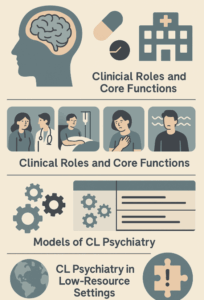🧠 Consultation–Liaison Psychiatry: Where Medicine Meets the Mind
 Consultation-Liaison (CL) Psychiatry, also known as Psychosomatic Medicine, is the subspecialty of psychiatry that bridges the worlds of mental health and general medicine. It focuses on how psychological factors influence physical illness—and how physical disease affects the mind.
Consultation-Liaison (CL) Psychiatry, also known as Psychosomatic Medicine, is the subspecialty of psychiatry that bridges the worlds of mental health and general medicine. It focuses on how psychological factors influence physical illness—and how physical disease affects the mind.
CL psychiatry thrives at the interface between disciplines. It combines clinical care, education, and research, helping hospitals move toward a more integrated, human-centered model of healing.
🏥 Clinical Roles and Core Functions
CL psychiatrists manage psychiatric and behavioral issues in patients with medical or surgical illnesses. These concerns usually fall into four broad categories:
-
Psychological presentation of organic disease – for example, anxiety in hyperthyroidism.
-
Psychiatric complications of medical illness – such as depression after a stroke or delirium in infection.
-
Psychological reactions to illness – like adjustment disorders or cancer-related anxiety.
-
Somatic presentation of psychiatric disorders – for instance, conversion or somatization symptoms.
Common Referral Reasons
-
Agitation or suicide attempts in wards
-
Non-adherence to treatment
-
Delirium or altered sensorium
-
Unexplained physical symptoms
-
Evaluation of decision-making capacity or psychiatric comorbidity
⚙️ Models of CL Psychiatry
Across the world, several models of service delivery have evolved:
| Model | Key Focus |
|---|---|
| Consultation | Traditional referral-based, patient-centered approach. |
| Liaison | Emphasis on education, collaboration, and communication with medical teams. |
| Bridge | Psychiatrists teaching and supporting primary care physicians. |
| Hybrid | Combination of consultation and liaison models; psychiatrist embedded within medical units. |
| Autonomous | Psychiatrist integrated directly into primary healthcare services. |
In India, the consultation model remains dominant, but hybrid and community-based approaches are gaining traction as hospitals move toward integrated care.
🌍 CL Psychiatry in Low-Resource Settings
In many developing regions, CL psychiatry faces several barriers:
-
Limited psychiatric manpower
-
Low awareness and stigma
-
Poor referral rates (often <3%, compared to ~10% in Western centers)
Strategies for Growth
-
Embedding psychiatry within primary care systems
-
Leveraging telepsychiatry and digital tools
-
Training non-psychiatric clinicians in basic mental health skills
-
Advocating for inclusion of CL psychiatry in hospital policy frameworks
🧩 Educational and Research Roles
Education is the lifeblood of CL psychiatry. Traditional bedside teaching and case discussions are now being complemented by:
-
Simulation-based learning for agitation management or suicide risk assessment
-
Teaching rotations, where residents mentor juniors
-
Digital learning tools, podcasts, and social media discussions
-
Mobile and online resources for continuing medical education
Modern training follows adult learning theory—self-directed, experiential, and problem-oriented—encouraging clinicians to integrate psychiatry naturally into their medical practice.
❤️ Interdisciplinary Collaboration
CL psychiatry depends on teamwork. Effective liaison requires:
-
Building mutual trust with physicians and surgeons
-
Using clear, practical communication instead of psychiatric jargon
-
Providing specific, actionable recommendations
-
Teaching colleagues how to recognize and manage psychiatric issues early
When this collaboration works, it transforms hospitals from fragmented systems into cohesive care networks.
🩸 Emerging Focus Areas
The field is evolving rapidly, with growing importance in:
-
Palliative and end-of-life care
-
Transplant psychiatry and capacity assessment
-
Addiction management in hospital settings
-
Community CL psychiatry and home-based liaison
-
Safe use of psychotropics in medically ill patients
🧭 The Core Philosophy
At its heart, CL psychiatry is about integration. It embodies the biopsychosocial model—acknowledging that healing the body requires understanding the mind.
By embedding psychiatry within medical and surgical care, CL psychiatrists:
-
Reduce stigma and fragmentation
-
Improve patient adherence and satisfaction
-
Enhance functional recovery and quality of life
In a world where the boundaries between “mental” and “physical” illness are dissolving, CL psychiatry is the discipline that reminds us—every organ has a psychology, and every thought has a biology.
✳️ Keywords
Consultation Liaison Psychiatry, Psychosomatic Medicine, Hospital Psychiatry, CL Psychiatry India, Integrated Mental Health, Telepsychiatry, Biopsychosocial Model
🩺 Dr. Srinivas Rajkumar T
MD (AIIMS, New Delhi), DNB, MBA (BITS Pilani)
Consultant Psychiatrist – Mind & Memory Clinic, Apollo Clinic (opp. Phoenix MarketCity), Velachery, Chennai – 600042
📞 +91-8595155808 | 🌐 www.srinivasaiims.com